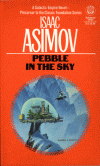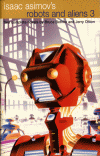The book opens up in 1949 on the day of a mysterious accident at Chicago’s Institute of Nuclear Research. Joseph Schwartz, while walking around on the other side of Chicago is somehow caught in an expanding beam of energy that transports him into an unfamiliar place. Actually, he has not traveled to another place but another time. Earth’s land is largely covered in radioactive soil, so that it can only support 20 million people. The result of this is the common practice of terminating anyone that cannot work or when they reach the age of sixty as a form of strict population control. Most people don’t resent this practice but rather look at as a way for making room for the young.
Joseph Schwartz knows none of this yet because all he sees is a dark empty world with a glimmering horizon with no cars or houses to be seen where there once was a thriving city. Initially he thinks he is on another world because everyone speaks a very odd language. As it turns out, he was transported thousands of years to a future Earth at a time that a Galactic Empire reigned and Earth was only one of 200 million planets. Schwartz wanders around and eventually finds the house of a family of three that takes him in. The young husband and wife have been working extra hard secretly supporting their father which isn’t yet sixty but can’t contribute working the farm because he can’t walk.
They seize the opportunity to use Schwartz, seemingly an idiot to them due to the language barrier, to take up some of the slack for work. They take Schwartz to Chica (Chicago in the future) to volunteer for a procedure which should increase his intelligence. The only problem is that the “Synapsifier” device invented by Dr. Shekt could end up killing the patient. In a somewhat cold statement, the husband assures the wife that if Schwartz dies they won’t be any worse off than before.
In the meantime, Dr. Bel Arvardan is embarking on an archaeological expedition in an attempt to verify the claims that Earth is the original world, the cradle of humanity. At the time the official theory is that groups of humans evolved separately and eventually converged after independently discovering interstellar travel. The Galactic Empire can’t bear to admit that humanity originated from this small dying world.
Dr. Arvardan is anxious to see the people of earth in their native environment, so he schedules a tour of the major cities of Earth, travelling to Chica first. By chance, while eating lunch he encounters a girl named Pola which is searching for a man, Schwartz, which has escaped the lab she works for (which happens to be where Dr. Shekt’s used the Synapsifier on Schwartz although Arvardan doesn’t know this yet). She describes an older man which he just saw at the same place he was eating lunch at. He helps her track down Schwartz, but they find themselves caught in a “Radiation Fever” scare. During the chase Dr. Arvardan finds himself strangely attracted to this Earthgirl. Arvardan sticks up for Pola when an Imperial officer treats her badly and finds himself on the wrong end of a neuronic whip. From this point forward the plotlines of Arvardan and Schwartz become intertwined.
One of the main themes in this book is the general distain that “Galactic Citizens” have for “Earthers”. While Earthers are not slaves of any sort, they are considered inferior and poisonous due to the radiation which is spread across most of Earth. Bel Arvardan likes to think of himself as progressive and tolerant of Earthers, but deep down he still has some problems coping with his romantic feelings for Pola Shekt throughout the novel. I think that Asimov handles Arvadan’s transformation quite well.
Earth, although part of the Empire, has a group of citizens called the Ancients which serve as rulers. Ancients enforce the various customs such as the “Sixty” harbor and avoiding the highly radioactive areas. Most Earthers, especially the “Ancients” harbor as much if not more hatred toward the rest of the Galaxy. They are resentful of their place in the Empire, isolated on a dying world with limited resources, resulting in three previous attempts to revolt. This hatred drives a new plot to revolt, but this time they might have the power to exterminate the rest of the galaxy. Dr. Arvardan, Dr. Shekt, Pola Shekt, and Joseph Schwartz must all work together to stop this plot.
Asimov does a good job of building up the main plot lines then intertwining them at just the right moment. The way he does this seems to pack quite a bit of events into just 230 pages. Most of the dialog is philosophical and engaging while moving the plot forward. One of the more amusing plots was the suspicion of the Ancients that Arvardan and Schwartz were working under Imperial direction while they were actually innocently associated (initially) with Dr. Schwartz. In the end their motives turned out to be the same, but the means was far from it. I found it a bit interesting that Joseph Schwartz is prominent on the back cover synopsis. Schwartz’s part isn’t insignificant by far, but the novel seems to be more about Dr. Bel Arvardan and his transformation.



